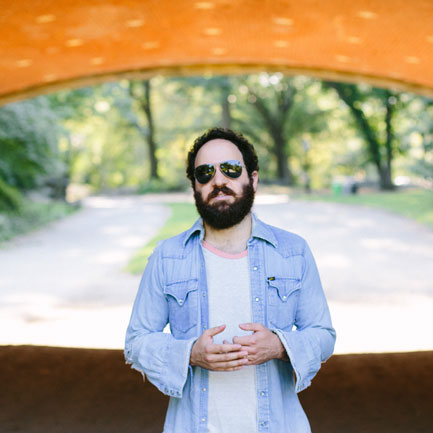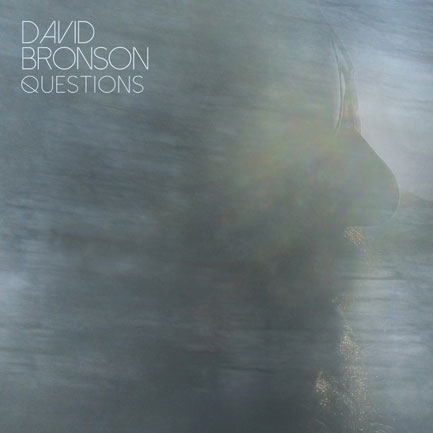Carlos Alomar Has A Mission; He’s Called David Bronson
David Bowie guitar guru plays on beardy NY singer-songwriter’s new album, reckons it’s the real deal.

CARLOS ALOMAR IS BEST KNOWN as David Bowie’s longest-standing collaborator – present and influential on Young Americans, Station, To Station, Low, “Heroes” and more of Bowie’s greatest works – but with a CV also boasting Iggy Pop, McCartney, Jagger, The Pretenders and Alicia Keys, we can safely assume he has the license to be selective about whom he works with. His latest project, therefore, is an intriguing one: playing for the somewhat obscure American singer-songwriter David Bronson on his forthcoming album Questions.

The emotive, New York-based Bronson – a success d'estime, with two albums (The Long Lost, Story) so far to his name – has a sweet vocal style somewhat reminiscent of Durham’s Martin Stephenson. But it was towards Bowie’s Young Americans that Bronson found himself leaning as he began work on his third album.
Enter Alomar – Bowie’s ‘plastic soul’ enabler – who adds inimitable guitar to the proceedings, along with singer wife Robin Clark, who contributes exquisite backups. They’ve tirelessly championed Bronson in his latest endeavour, and have even involved their daughter, chart R&B singer Lea-Lórien.
Ahead of the record’s release on January 13, 2015 via Big Arc Records, MOJO caught up with Alomar to discuss his fascination with Bronson, the intricacies of rhythm guitar playing and the true meaning of a ‘studio love-fest’.
--------------------------------
MOJO: How did you and David Bronson first get together?
Carlos Alomar: [session vocalist] Gordon Grody, who’s a family friend, was contacted by Godfrey Diamond, the producer, to do backing vocals. Gordon suggested that Robin Clark should also get involved, and Godfrey said, “Oh my God, of course! Can you reach her?” to which Gordon said, “Yeah, she’s one phone call away.” So, originally, Gordon and Robin were actually contacted to do the job. I just offered to drive Robin down to the studio – so I was actually the driver!
“I think that David Bronson voices the inner yearnings of the heart.” Carlos Alomar
Robin got there, and David Bronson said, “Just tell your driver that he can park over here,” to which Robin replied, “Well he’s not just my driver; he’s my husband, Carlos Alomar.” David said, “Carlos Alomar? Well, have him come in and say hello!” So I came in, and we just bonded. I wasn’t really there to do anything, just to support. But I knew Godfrey Diamond, so while they were in the studio we talked about production notes and suggestions. It then turned out that Gordon Grody wasn’t able to continue doing the sessions, so they were at a bit of a loss. My wife suggested, “Well, I have Carlos here, and I have my daughter, who’s a famous singer too…” So, the Alomars were born! My daughter Lea-Lórien, My wife, Robin Clark, and myself: we did all of the background vocals on the album, and I did some of the guitar work, along with Seahag [Robbie “Seahag” Mangano, guitarist].
We don’t know much about Bronson over here, but he’s got a very distinctive sound. And he seems to write great songs.
Absolutely. I’m very choosy. I work as much as I can, but I don’t have to. I listened to the writing and I said to myself, “Oh, my God – a real songwriter!” I also thought, “This really good, but it needs a little… harder edge to it,” so when I came in I just tried to put that edge on it, and the album started to take on a life of its own. You know, we look at so many indie artists and don’t realise that before their ‘breakout album’, they already had five albums under their belt. Quite honestly, I believe that this is the album for David Bronson. I believe that this album is amazing.
David’s look is kind of ‘indie’, but there’s a mainstream clarity about his songwriting.
There is. I understand the nature of the business - that you have to be young, you have to have a certain look, you have to have no talent [laughs]. But I think that the relationship between an artist and his fan base revolves around the fact that it’s their bragging right that they discovered him, and that they discovered him for a very particular reason: “Listen to what he’s saying!” Not “Look how cute he is.” Paul Simon doesn’t have ‘the look’; nor does Cat Stevens, or Richie Havens… there are a lot of people who are disguised in that way. But it’s when they open their mouths...

I think that David Bronson voices the inner yearnings of the heart, and I think that’s the most powerful thing an artist can do. You can read that Robin Clark is on it and that Carlos Alomar is on it, that Godfrey Diamond produced it – these are all credible people, but it doesn’t mean a thing unless the artist himself can work with all of that. If it takes a name like me to do it then that’s fine, but it’s not going to make it any better when you listen to it.
What kind of a guy is David Bronson?
He’s the sweetest man you’ve ever met. It was a love-fest! When you look at the lyrics, the sensitivity they exude… you’re looking at a philosopher of art, beauty, love and compassion. And that’s why it was easy for Robin and I to say, “We need to help this man – this man’s voice needs to be heard.” We told him that we would do anything that we can to help deliver him and his message to the general public. I needed to hear an artist who, when he opens his mouth, steals the show. And, David does. There’s no doubting it. When you listen to the music, the music does not get in the way of the message, and that is hard to find.
Watch Alomar and Bronson at work on the track Connect The Dots. Video exclusive to MOJO.
Says David Bronson, in an email to MOJO: “Connect the Dots was one of the songs we did at the first session with Gordon Grody and the Alomars, which gives it this interesting double meaning for me, since the song has something to do with the notion of fate, and that session would end up having so much to do with the ultimate state of the album. Not only the sound and form of it, but the experience itself, the feeling and memory of the whole thing. I continue to learn that this is what an album consists of, at least as much as anything else. As for the video, I guess I must have wanted to convey some of that kind of feeling when putting it together, though I didn't realize it explicitly while doing it. Like with most creative decisions, it was just about going for something that felt right.”
For more about David Bronson and Questions...
Alomar interview by Danny Eccleston. Story by Will Stokes.

